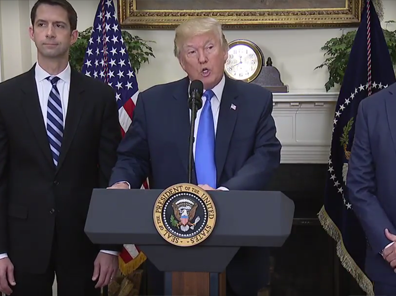
Even before President Trump made his televised national pitch Saturday to advocate for an immigration compromise that would provide a path for ending the partial shutdown of the government, Democrats said they would not go along with it, whatever it might say — a position that defies belief.
Immediately afterward, several groups that advocate in favor of stronger immigration controls and enforcement jumped on the president's comments as a wall-for-amnesty trade-off.
By contrast, I, and many of my colleagues here at the Center for Immigration Studies, have been waiting to see the details because, to use the hackneyed but often true aphorism, the devil is in the details. That's not to say that I'm not concerned; without doubt I am.
Senate Majority Leader Mitch McConnell is promising to introduce a bill favored by the president this week, but it seems to me that an unseemly rush to pass something — anything — in the Senate is an invitation for a whole host of open floor amendments that can potentially turn a bill from simply mediocre to a disaster. If so, will the president use the power of the veto, or pretend that everything's copacetic since it might allow him an escape hatch from an even more protracted shutdown?
Even with these concerns, as I say, I've been trying to take a wait-and-see attitude about the proposal. Unfortunately, after Saturday inevitably comes Sunday, and with it the plethora of political talk shows to rehash everything, which in turn often prompts reactions from the president, this time to both recalcitrant Democrats and also to immigration restrictionists critiquing the outlines of his proposal.
In the instant situation, the best thing the president could have done was stand pat, say nothing, allow the details of the proposal speak for themselves, and let the matter take its course. But that often isn't the president's way, and he can sometimes gild the lily in his attempt to persuade.
In response to the speech, the president tweeted:
No, Amnesty is not a part of my offer. It is a 3 year extension of DACA. Amnesty will be used only on a much bigger deal, whether on immigration or something else. Likewise there will be no big push to remove the 11,000,000 plus people who are here illegally-but be careful Nancy!
— Donald J. Trump (@realDonaldTrump) January 20, 2019
I audibly caught my breath when I read, and re-read, the last part of that tweet. What do you mean, Mr. President, that there isn't any push to remove the millions of people here illegally? What, then, do we have an interior immigration enforcement arm for?
Immigration isn't just a qualitative problem stemming from undesirable aliens involved in drugs or crime. It is also a quantitative problem stemming from the sheer volume of numbers. Isn't that, in fact, why you have suggested you want to declare a national emergency? Because of the volume of aliens illegally crossing our southern border?
Do you think those numbers go away, and that these illegal border-crossers simply disappear, once they escape, or are released, into the interior? They don't. Illegal aliens place undue burdens on federal, state, and local housing, welfare, educational, and health networks. They depress wages and occupy jobs that would otherwise go to citizens and lawfully authorized workers.
If, Mr. President, the emphasis of your administration's immigration policy is focused only at the physical frontiers of the United States with casual indifference to the millions already living and working unlawfully in the interior, then you are creating an empty shell that will continue to guarantee the dysfunction of our immigration system and contempt for the rule of law for decades more to come.
